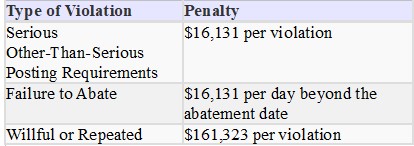
Housekeeping Workplace Safety Program (Material Storage)
Purpose
Attention to general cleanliness, storage and housekeeping can prevent numerous accidents. This chapter covers items not discussed in other areas and is not intended to cover all specific housekeeping requirements. Good housekeeping efforts are a part of the company fire prevention and accident prevention program.
Management and Employee Responsibility
All Employees share the responsibility for maintaining good housekeeping practice and following the established housekeeping procedures. The Manager, Supervisors, Safety Coordinator and Safety Committee will be responsible to monitor housekeeping as part of their facility safety inspection procedures, note any hazards or areas of non-compliance, initiate clean-up procedures and provide follow-up. Management has the additional responsibility to provide disciplinary action when necessary to reinforce compliance with this program.
Smoking Policy
Smoking is not permitted inside buildings and/or within 50 feet of material storage. This includes all offices, rest rooms, locker rooms, production floor, storage areas, coolers, etc. Smoking is permitted outside in designated areas and in the Smoking Section of authorized break areas before work, after work and during breaks. To prevent fires and keep the grounds neat and orderly, all cigarette/cigar ashes and butts are to be disposed in the provided butt cans or ash-trays only.
Hazards
Improper housekeeping and material storage can create or hide numerous hazards such as:
• Slip & trip hazards
• Chemical exposure
• Contact with sharp objects
• Fire & Explosion hazards
• Over loading of storage shelves and bins
Hazard Control
Offices - Office areas are to be kept neat and orderly. The following general rules apply to prevent injuries and maintain a professional appearance.
1. All aisles, emergency exits, fire extinguishers, etc., will be kept clear (a minimum of three feet of either side) of material storage (temporary and permanent) at all times.
2. Storage areas will be maintained orderly at all times. When supplies are received, the supplies will be stored properly.
3. Spills will be cleaned-up immediately and wastes disposed of properly.
4. All waste receptacles will be lined with a plastic trash bag to avoid direct contact while handling. Custodial Employees will use rubber gloves and compaction bar when handling wastes.
5. Keep file and desk drawers closed when not attended to avoid injuries. Open only one drawer at a time to prevent tipping of file cabinets.
6. At the end of the business day, turn off all office equipment (area heaters, lamps, coffee-maker, PCs, etc.) and lights to save energy and prevent fires. All space heaters be un-plugged at the end of the day to assure they have been turned-off.
Production Areas - Production areas will be kept neat and orderly, during operations and as follows:
1. All aisles, emergency exits, fire extinguishers, eye wash stations, etc., will be kept clear (a minimum of three feet in front of and to either side) of product storage, material storage, fork trucks and pallet jacks at all times.
2. Spills will be cleaned up immediately.
3. All process leaks will be reported to supervision and maintenance for immediate repair and clean-up.
4. Utility Employees will be responsible to keep aisles and work floors clear of excessive debris and waste materials during shift operation, between breaks and at shift change when necessary or directed by supervision; however, all Employees are responsible to communicate slippery floors to supervision for immediate clean-up.
5. All refuse and waste materials will be placed in the recognized waste containers for disposal.
Rest Rooms, Locker Rooms and Cafeteria - Rest rooms, locker rooms and cafeteria are provided as a convenience for all Employees. The following rules will apply:
1. Employees are expected to clean-up after themselves as a common courtesy to fellow Employees.
2. Flammable materials (fire works, explosives, gasoline, etc.) may not stored in lockers or brought on company property.
3. Personal food item will not be stored in lockers or cafeteria overnight.
4. All waste receptacles will be lined with a plastic trash bag to avoid direct contact while handling and Custodial Employees will use rubber gloves and compaction bar when handling wastes.
5. All refuse and waste materials will be placed in the recognized waste containers for disposal.
Maintenance Areas
1. All aisles, emergency exits, fire extinguishers, etc., will be kept clear (a minimum of three feet of either side) of material storage (temporary and permanent) at all times.
2. Storage Areas will be maintained orderly at all times:
a. Pipe stock stored horizontally on racks and sorted by size
b. Metal stock stored horizontally on racks and sorted by size
c. Sheet metal stock stored vertically in racks and sorted by type
d. All fittings, etc., stored in bins on shelves and sorted by type and use
e. All flammables stored in OSHA-approved Fire Cabinets and self-closing cans where necessary
3. Spills will be cleaned-up immediately by the person responsible and wastes disposed properly.
4. All refuse and waste materials will be placed in the recognized waste containers for disposal.
Grounds - The grounds surrounding the plant are an extension of the work place. Grounds that are kept neat and

GET INSTANT ACCESS
to THE MEMBERS LIBRARY
Safety materials created by safety professionals.
Access to the Safety Manager software.
Wide variety of safety videos and courses.
**Brand New** Safety Training Management System
Pre-Made Safety Materials Ready For Use
Created by experienced safety professionals & risk consultants. Saving you time, money, and risk of injuries.
95% of the work already done.
Below are the maximum penalty amounts, with the annual adjustment for inflation, that may be assessed after Jan. 15, 2024. (See OSHA Memo, Jan. 8, 2024).

**New OSHA HEAT 90 DAY**
>>Download Free HERE<<
**New 2024 OSHA 300 Form**
>>Download Free HERE<<
**Brand New**
Free with full membership subscription
Training LMS System
Ask The Safety Consultant
Safety Equipment Deal Finder

“SafetyInfo.com is the first go-to website for safety professionals and companies to use in establishing a solid safety program"
-Mike McKenzie, Certified Safety & Health Manager (CSHM), McSafety Solutions™
Note: You must have a full subscription to the Safety Library in order to use this material. Any use outside of your organization, for resell, or without an active membership is strictly prohibited and may result in prosecution under copyright infringement laws. Please contact us first, if you would be interested in reselling or using our materials for reproduction.
Inside the Members Library
Topic Index
Accident Prevention
Air Quality
Asbestos
Bloodborne Pathogens
Boilers
Chemical Safety
Compressed Gas
Confined Space
Construction
Construction Worksite
Cranes & Slings
Driver / Fleet Safety
Drug Free Workplace
Electrical
Emergency Management
Engineering Safety
Environmental
Equipment
Ergonomics
Fall Protection
Fire Safety & Prevention
First Aid
Flammable Materials
Forklifts
Hazard Communication
Hazardous Materials
Hearing Protection
Heat Stress
Hot Work
Housekeeping
Job Safety Analysis
Laboratory
Ladders
Lead
Lockout-Tagout
Machinery & Equipment
Material Handling
MSDS (SDS)
Medical & First Aid
Occupational Health
Office Safety
Off the Job Safety
Personal Protection
Process Safety
Record Keeping
Respiratory Protection
Silica Safety
Rules & Policies
Signs & Labels
Slips, Trips & Fall
Training
Terrorism Programs
Tool Safety
Vehicle & Driver
Violence Programs
Welding & Hot Work
Training Videos
Library Index
Training Materials
Videos/Courses
Talks
Articles
PowerPoint
Handouts
Training Overheads
Quizzes
Supervisor Briefs
Management Briefs
Safety Sessions
2 Minute OSHA Safety Talks
Pamphlets
First Aid Training
Supervisor Training
Hazardous Materials
Bomb Threat
Crossword Puzzles
Biological Agents
Forms & Documents
Forms
Checklists
Audit Guides
Inspections Guides
Signs & Labels
Environmental Audit Guides
Recordkeeping - OSHA 300
Sign & Label Maker
Safety Management Resources
Safety Manuals/Written Programs
Ergonomic Programs
Emergency Plans
Process Safety Management
Construction Safety
Occupational Health
Environmental
Topic Sheets
DOT Fleet-Driver
Hazardous Materials
Chemical Safety
Drug Free Workplace
Terrorism Programs
Development Guides
Safety Manager Software
Safety References & Graphics
Technical Safety Information
Posters
Topic & Fact Sheets
Development Information
Job Specific Safety Rules
Terrorism
Calculators
Safety Comic Strips
New Safety Training System
Schedule and train your employees with our materials. Add unlimited amount of employees. Record all progress and issue certificates. For group and individual training sessions.

